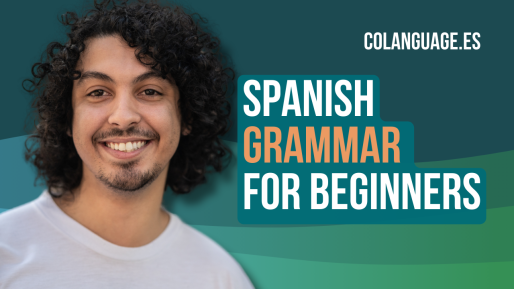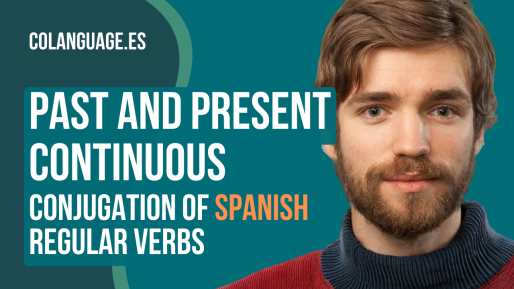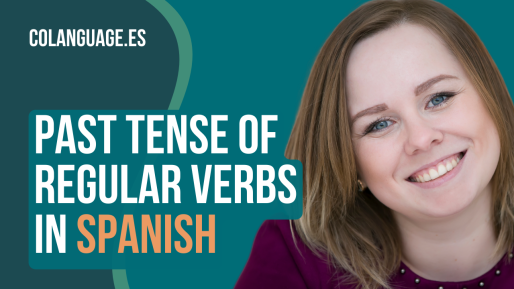Past participle in Spanish: conjugation of regular and irregular verbs Share Copied!
Spanish Emotions and feelings A1 Describing objects and people
Formation of the past participle in Spanish. We cover both the regular and irregular verbs in this lesson.
<< Emociones y sentimientos (Emotions and feelings)
Video
Podcast
What is the past participle?
A past participle is a verb form that can be used to create perfect tenses, adjectives or passive voices.
-
Había llamado a su amiga antes de salir para el aeropuerto. (She had called her friend before leaving for the airport.)perfect tense
-
Llegamos a un lugar abandonado. (We arrived at an abandoned place.)adjective
-
Es querida por todos. (She is loved by everyone.)passive voice
The past participles of regular verbs in "-ar" in Spanish
To form the past participle of regular "-ar" verbs, take the stem of the infinitive and add the ending "-ado".
| Tense | Spanish | English |
|---|---|---|
| Pretérito perfecto | Tu prima ha preparado una deliciosa cena. | Your cousin has prepared a delicious dinner. |
| ¿Has limpiado la casa? | Have you cleaned the house? | |
| He hablado con mi mejor amigo durante dos horas. | I have talked to my best friend for two hours. | |
| Pretérito pluscuamperfecto | Ellos habían estudiado para el examen. | They had studied for the exam. |
In perfect tenses, past participles are preceded by the conjugated verb "haber" (to have).
Yo he hablado con mi amiga. (I have spoken with my friend.)
Listening exercise
In the following exercise, we will practice the past participle of "-ar" verbs in Spanish.
| Spanish | English | |
|---|---|---|
| Daniel | He preparado la comida para toda la semana. ¿Y tú? | I have prepared food for the whole week. And you? |
| María | Yo he estudiado para el examen de historia. | I have studied for the history exam. |
| Daniel | ¡Qué bien! También he hablado con mi hermana por teléfono. | That's great! I have also spoken to my sister on the phone. |
| María | Has hecho muchas cosas. Yo he limpiado mi habitación. | You have done many things. I have cleaned my room. |
The past participle of regular verbs in "-er" and "-ir"
To form the past participle of regular "-er" or "-ir" verbs, take the stem of the infinitive and add the ending "-ido".
| Tense | Spanish | English |
|---|---|---|
| Pretérito perfecto | He bebido dos tazas de café esta mañana. | I have drunk two cups of coffee this morning. |
| Mi madre ha aprendido a bailar salsa recientemente. | My mom has learned to dance salsa recently. | |
| Pretérito pluscuamperfecto | Mis amigas ya habían comido en ese restaurante. | My friends had already eaten in that restaurant. |
The past participle can also be used with the passive voice.
Los últimos días fueron vividos con intensidad. (The last days were lived with intensity.)
Listening exercise
In the following exercise, we will practice the past participle of "-er" and "-ir" verbs in Spanish.
| Spanish | English | |
|---|---|---|
| Daniel | ¿Has vivido en otro país alguna vez? | Have you ever lived in another country? |
| María | Sí, he vivido en Colombia y en Canadá. | Yes, I have lived in Colombia and Canada. |
| Daniel | ¡Qué interesante! ¿Y qué has aprendido de esos países? | How interesting! And what have you learned from those countries? |
| María | He aprendido a cocinar nuevas recetas caseras. | I have learned to cook new homemade recipes. |
| Daniel | ¡Suena genial! Yo he comido en un restaurante colombiano recientemente. | Sounds great! I have eaten at a Colombian restaurant recently. |
The past participle of irregular verbs in Spanish
Irregular verbs can be tricky because they do not follow any rules.
| Tense | Spanish | English |
|---|---|---|
| Pretérito perfecto | Lo que has dicho es verdad. | What you have said is true. |
| Nuestro equipo ha hecho grandes avances en la investigación. | Our team has made great progress in the research. | |
| Los resultados han sido sorprendentes. | The results have been surprising. | |
| Futuro perfecto | ¿Habrán visto la película ya? | Will they have seen the movie already? |
| Oración pasiva | El trueno fue oído por todos. | The thunder was heard by everyone. |
The past participle can also function as an adjective. In that case it agrees in gender and number with the noun.
La puerta estaba abierta. (The door was open.) the noun is feminine and singular.
Listening exercise
In the following exercise, we will practice the past participle of irregular verbs in Spanish.
| Spanish | English | |
|---|---|---|
| Daniel | Hola, ¿qué tal ha ido tu semana? | Hello, how has been your week? |
| María | ¡Hola! Ha sido bastante interesante. ¿Y la tuya? | Hello! It has been quite interesting. And yours? |
| Daniel | Yo he abierto mi primera cuenta bancaria. | I have opened my first bank account. |
| María | ¡Felicidades! Por cierto, he oído que vas a publicar un libro. | Congratulations! By the way, I have heard that you are going to publish a book. |
| Daniel | Sí, he hecho progresos en el proyecto pero aún no está acabado. | Yes, I have made progress on the project but it is not finished yet. |
| María | ¡Ya te lo había dicho! Eres una persona con mucho talento. | I have already told you! You are a very talented person. |
Key takeaways
Here is a quick summary of this lesson.
- A past participle is a verb form that can be used to create perfect tenses, adjectives or passive voices.
- To form the past participle of regular verbs, take the stem of the infinitive and add the ending "-ado" (-ar verbs) or "-ido" (-er and -ir verbs).
- The formation of the past participle of irregular verbs does not follow any rules.
Subscribe to our social media channels to get free daily exercises!



